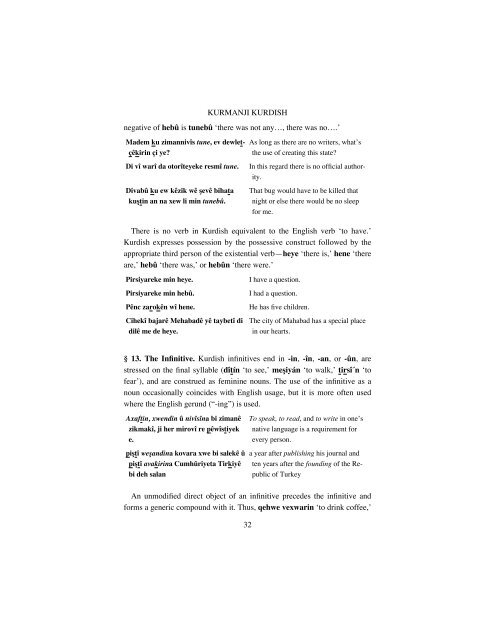Create successful ePaper yourself
Turn your PDF publications into a flip-book with our unique Google optimized e-Paper software.
negative of hebû is tunebû ‘there was not any…, there was no….’<br />
Madem ku zimannivîs tune, ev dewletçêkirin<br />
çi ye?<br />
As long as there are no writers, what’s<br />
the use of creating this state?<br />
Di vî warî da otorîteyeke resmî tune. In this regard there is no official authority.<br />
Divabû ku ew kêzik wê şevê bihata<br />
kuştin an na xew li min tunebû.<br />
That bug would have to be killed that<br />
night or else there would be no sleep<br />
for me.<br />
There is no verb in Kurdish equivalent to the English verb ‘to have.’<br />
Kurdish expresses possession by the possessive construct followed by the<br />
appropriate third person of the existential verb—heye ‘there is,’ hene ‘there<br />
are,’ hebû ‘there was,’ or hebûn ‘there were.’<br />
Pirsiyareke min heye. I have a question.<br />
Pirsiyareke min hebû. I had a question.<br />
Pênc zarokên wî hene. He has five children.<br />
Cihekî bajarê Mehabadê yê taybetî di<br />
dilê me de heye.<br />
The city of Mahabad has a special place<br />
in our hearts.<br />
§ 13. The Infinitive. Kurdish infinitives end in -in, -în, -an, or -ûn, are<br />
stressed on the final syllable (dîtín ‘to see,’ meşiyán ‘to walk,’ tirsî´n ‘to<br />
fear’), and are construed as feminine nouns. The use of the infinitive as a<br />
noun occasionally coincides with English usage, but it is more often used<br />
where the English gerund (“-ing”) is used.<br />
Axaftin, xwendin û nivîsîna bi zimanê<br />
zikmakî, ji her mirovî re pêwîstiyek<br />
e.<br />
piştî weşandina kovara xwe bi salekê û<br />
piştî avakirina Cumhûriyeta Tirkiyê<br />
bi deh salan<br />
KURMANJI KURDISH<br />
To speak, to read, and to write in one’s<br />
native language is a requirement for<br />
every person.<br />
a year after publishing his journal and<br />
ten years after the founding of the Republic<br />
of Turkey<br />
An unmodified direct object of an infinitive precedes the infinitive and<br />
forms a generic compound with it. Thus, qehwe vexwarin ‘to drink coffee,’<br />
32


